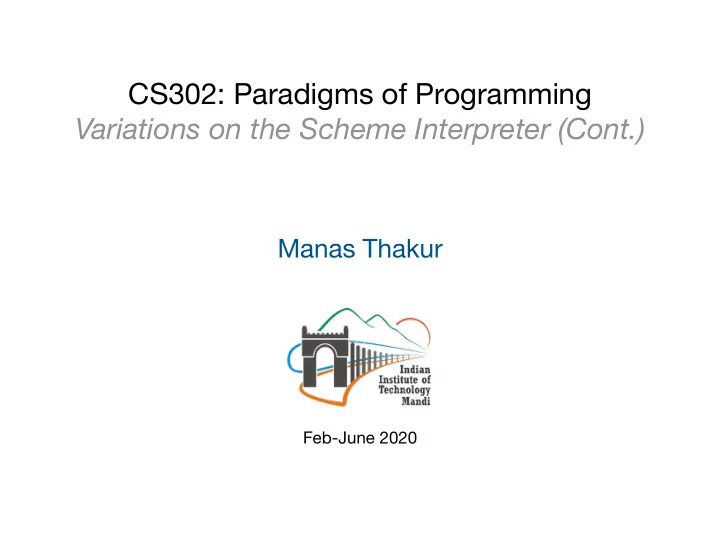

CS302: Paradigms of Programming Variations on the Scheme Interpreter (Cont.) Manas Thakur Feb-June 2020
Graduate to Post-Graduate • We can use the knowledge gained to experiment with programming language technology in several ways: 1. Extend the language with new syntactic constructs 2. Explore various design choices in the space of programming languages 3. Design new programming languages themselves! 2
2a. Exploring design choices: Lexical vs Dynamic Scoping 3
Lexical vs dynamic scoping • What’s the value returned by g ? • Lexical scoping: 0 int x = 0; int f() { return x; } • Dynamic scoping: 1 int g() { int x = 1; return f(); } • Lexical scoping: Free variables are bound in the environment in which the procedure was defined (closure). • Examples: Pascal, Ada, Scheme, Haskell, C and family. • Dynamic scoping: Free variables are bound the most recently assigned value during program execution. • Examples: Original Lisp, Bash, LaTeX. 4
Lexical vs dynamic scoping (Cont.) • What’s the value returned by g ? x <- 1 • Lexical scoping: 1 f <- function(a) x + a g <- function() { • Dynamic scoping: 2 x <- 2 f(0) } • Which language is this? g() • Homework: Find out which scoping is used in R. 5
Discussion • Which one — lexical or dynamic scoping — is more natural? • Which one should be easier to implement? • Original Lisp had dynamic scoping! • Then why switch to lexical scoping in Scheme? 6
Flashback • Recall the general sum procedure from the days we learnt about higher order functions: (define (sum term a next b) (if (> a b) 0 (+ (term a) (sum term (next a) next b)))) • Usage: (define (sum-cubes a b) (define (cube x) (expt x 3)) Notice the (sum cube a inc b)) binding • One more (sum of n th powers): (define (sum-powers a b n) (define (nth-power x) (expt x n)) (sum nth-power a inc b)) 7
Why not dynamic scoping? 8
Problem with dynamic scoping • Say the programmer renamed b in the procedure sum to n : (define (sum term a next n) (if (> a n) 0 (+ (term a) (sum term (next a) next n)))) (define (sum-powers a b n) (define (nth-power x) (expt x n)) (sum nth-power a inc b)) • Whoops! Problem irukke . n got bound to b 9
Then why dynamic scoping? 10
Classwork ( for me! ) (define (sum-powers a b n) (define (nth-power x) (expt x n)) (sum nth-power a inc b)) • Write an analogous procedure to multiply the n th powers. (define (product-powers a b n) (define (nth-power x) (expt x n)) (product nth-power a inc b)) (define (sum-powers a b n) • Can we reuse nth-power ? (sum nth-power a inc b)) (define (product-powers a b n) • Lexical scoping: No. (product nth-power a inc b)) • Dynamic scoping: Yes! (define (nth-power x) (expt x n)) 11
Now comes fun! 12
Make Scheme dynamically scoped • Remarkably simple: Just extend the correct environment! In fact, we don’t need to bind the environment while creating procedure objects! 13
Scoping in action 14
Assignment 3 Part A (7 Marks) • Extend the eval/apply interpreter to have both lexical and dynamic scoping. • A parameter may be declared to be dynamically scoped as: (define (foo a (dynamic b)) ( ... ) • A variable may be referenced dynamically as: (define (foo a (dynamic b)) (+ a (dynamic-ref b)) • Referencing a variable that wasn’t declared as dynamically scoped defaults to lexical scoping. • Interpreter implementation from textbook will be provided to you. 15
Insight of the month (semester?) • How do we solve the limitation of lexical scoping? (define make-exp By being good in (lambda (n) computing science :-) (lambda (x) (expt x n)))) (define (sum-powers a b n) (define (product-powers a b n) (sum (make-exp n) a inc b)) (product (make-exp n) a inc b)) • What’s the powerful feature without which you couldn’t solve this problem? • Ability to return functions as values. • In general, granting first-class citizenship to functions ! 16
Recommend
More recommend